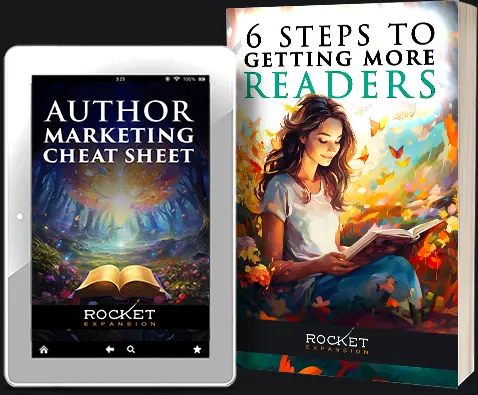16 Proven Ways To Become A Better Writer

When it comes to writing, we envision ourselves typing away at a keyboard, in the zone. We know exactly what to write and how to write it.
Let’s be honest with ourselves. Writing is never like that. It may not even be 50% of that.
Yet we still do it. We sit down and stare at a blank page and hope and pray the words eventually come.
Sadly, hoping and praying only get you so far. And it won’t make this process any easier for you. But becoming a better writer will.
If you’re ready to take that step towards betterment, then you’re in the right place. We’ll show you all the tips, tricks, steps, and habits you need to become a better writer.
Why Should You Become A Better Writer?
Learning how to become a better writer will help you improve your writing process and cut out what doesn’t work. Ultimately, you’ll be happier because you’re more productive.
Plus, being a better writer means that your readers will enjoy your work more. And although having self-validation is important, all writers crave to impress and be praised.
Being better at what you do best will get you the attention you know you deserve.
How To Get Better at Writing
Writing is like every other skill in the sense that you must put effort into progressing it. But it’s also like no other skill because each new story you write feels like you’re reinventing the wheel.
We’re going to show you some tips and practices on how to get better at writing, so reinventing the wheel won’t be as hard as it sounds.
- Just write (even when you don’t want to)
- Read like it’s your job
- Consider the reader
- Get feedback from friends and family
- Read out loud
- Join a community
- Imitation is a form of flattery…and learning
- Use writing prompts
- Use a Thesaurus
- Know when to walk away
- Accept failure
Just write (even when you don’t want to)
“You can always edit a bad page. You can’t edit a blank page.”
Jodi Picoult
As an author, you’ve probably heard this before. It sounds so obvious, but it still needs to be said.
Put your pen to the paper, or your cursor to the page and get to writing! Because you won’t get better if you don’t practice.
It may not be your best work, and you may even delete it tomorrow, but exercising your writing muscle every day will make ideas come easier.
The trick is to pick a goal that suits you best. You could set a time limit for 10-15 minutes each day. Or set a word count goal of 500 words.
As you get better at maintaining this daily habit it gets easier to maintain. You can increase the time or word count to challenge yourself.
Don’t just write, plan first!
The problem with just sitting down to write is you’ll be staring at a blank page as the timer runs down. The best way to ensure you use your writing time well is to plan the session first.
Are you going to free-write about your day, writing without concern for how it looks on the page? Or are you going to flesh out the characters and do some world building?
Decide your plan of action and outline what you want to write so that you know where to start once you begin your writing session.
Read like it’s your job
“Writing comes from reading, and reading is the finest teacher of how to write.”
Annie Proulx
When figuring out how to become a better writer, you must be a reader first.
But not just any reader. You need to read like you get paid to do it.
Study the writing, break down why you like it, and analyze why certain concepts and techniques worked.
Remember, you’re not limited to reading in your genre. Reading different genres will not only teach you new writing styles, but it will give you ideas as new perspectives fill your mind.
The following are a few more benefits of reading:
- Reader’s perspective: You’ll learn how readers respond to stories based on your own experiences of reading.
- Vocabulary: You’ll learn new words and ways of phrasing them.
- Writing inspiration: Constantly refilling your well of creativity means you will never run out of inspiration.
- Story decision making: By analyzing story arcs and mechanics in other books, you’ll get better at crafting your own story arcs
To get the most out of reading, make sure to keep a notebook at your side to jot down your thoughts. These are some elements that you could make notes on as you read:
- Sentence and paragraph structures
- Character complexity
- Word choice
- Information placement
- Worldbuilding elements
- Side plot and main plot story arcs
Consider the reader
It’s important that you’re happy with your writing, but next in line are the readers.
As much as you want to impress the readers, you want your message and theme to be expressed above all else.
Think about what your readers would like, or rather what they need to read from you. What do you want them to take away from your story?
Having these thoughts in your mind as you write will help you shape your story in a way that will have readers giving you a standing ovation.
Get feedback from friends and family
Some authors may feel the need to hold their story close to their chest, like Smeagol in Lord of The Rings.
But stories should be shared…even if they’re not ready yet. You don’t become a better writer by keeping your precious all to yourself.
Sometimes you can’t see glaringly obvious flaws and faults because you’ve been staring at them for so long that they’ve gone invisible.
Ask a trusted friend or family member to give your draft a gander and let them give their honest opinion on what’s working and what confuses them.
Read out loud
When revising your work, you could get stuck in a loop and go cross-eyed. There’s so much to go through!
You should read your writing out loud. It will make unnatural sounding sentences come to the surface for you to edit it.
Reading dialogue out loud is a great way to have realistic conversations and discussions between your characters.
Your housemates may think you’re crazy for having an argument with yourself, but the end product will be worth it.
Join a community
Every writer needs a community of people that understands what they’re going through.
You can learn from those writers or pass on your own wisdom. You could even get connected to other industry professionals who could change your author career for the better.
But if you want to use your author community to learn how to become a better writer, you have to be all in.
That means sharing your writing goals and letting yourself be held accountable for them. And you’ll hold your author friends accountable to their goals too!
Imitation is a form of flattery…and learning
If you’re looking to improve as a writer and go into different genres, you should imitate other good writers.
Take characters they’ve created or scenarios they’ve made and write a scene using their tone and structure.
As you try to imitate them, you’re by proxy learning how to write in different styles that you can adapt to your writing.
And it’s a nice little break from thinking as everything besides the story is done for you. This is why fanfiction is a fun way to learn about writing.
Use writing prompts
When looking to find a new voice and tone for your writing, you may want to practice without the help of another author’s work.
There is a plethora of resources you can use to find writing prompts that get your brain ticking.
Top Tip: Our blog, 40 Tips for Writing Inspiration (Plus Writing Prompts and Tools), has writing prompts for different genres that could get your juices flowing, so be sure to check it out!
Use a Thesaurus
You’ve learned so many cool words while reading. You swear you did. But why can’t you remember any of them while you’re writing? They’re in your head…somewhere.
Instead of staring off into the distance with the word on the tip of your tongue, whip out the thesaurus.
There’s no shame in it!
A thesaurus is great for finding that word that helps describe the setting or your character’s mood, for example.
But it’s also great for stopping you from using complicated words and phrases that lose the message you’re going for.
Being verbose is like cotton candy. It looks huge, fluffy, and pretty. But once you dissolve it, it’s just flavored sugar that can give you a toothache.
Get straight to the point so you don’t confuse the reader.
Know when to walk away
Sometimes becoming a better writer means learning when not to write.
Maybe you’ve lost passion for the story you’re writing, or you can’t channel the character’s voices anymore.
Or you’re not ready for the story you’re dreaming up. You need more time to grow.
Perhaps the story just isn’t what you want it to be.
If any of this sounds familiar, then it’s time to walk away. Put it down and write something else.
Walking away could also mean that you need to stop editing and adjusting the story because perfection doesn’t exist. Trust your instincts and consider the advice of those who have read your drafts.
Accept failure
Becoming a better writer doesn’t just revolve around writing. It’s all the emotions and activities surrounding it too.
The publishing industry, the fans, the haters.
Whatever happens, it won’t only be a success. You will fail. It’s not only inevitable, it’s destined.
Everyone fails, but when an author fails it hurts in a different way. It hits you personally and professionally all at once.
But accepting it doesn’t mean complacency. It means you get back on the horse to ride again.
How To Develop Writing Habits
You can’t say, “I’ll become a better writer,” and presto, you’re a better writer.
You must build your good writing habits from the ground up and stick to them.
The below writing habits turn good writers into great writers.
- Schedule procrastination
- Set goals
- Have a routine
- Understand your process
- Never stop writing
Schedule procrastination
Procrastinating is so easy. It’s a click or a daydream away.
It can sound like: “I’ll wait till 13:00 exactly and start.”
13:00 rolls around and you’re still scrolling.
We’ve all been there!
Don’t beat yourself up for procrastinating. Instead, schedule it. Write for 60 minutes then listen to 15 minutes of your favorite music, then write again for another 60-minute session.
Or plan a fun evening of slacking off and not feeling guilty about it. But the next morning you have a word count goal to meet.
“Time you enjoy wasting is not wasted time.”
Marthe Troly-Curtin, Phrynette Married
But remember to schedule the right kinds of procrastination. For example, instead of scrolling through TikTok for 30 minutes, put on that TV show you’ve been meaning to catch up on. You could also take a walk and listen to a podcast.
Set goals
You won’t achieve your writing goals if you don’t have any set. And vague, grand goals won’t cut it.
If you want to finish your first draft in 3 months, plan out how you will do it. What are your daily, weekly, and monthly goals?
Your goals need to be realistic and easy to track. Use a writing journal or a spreadsheet to write your goals and track progress every day against them.
Have a routine
We’d love to think as writers that we’re free spirits who are called to write stories by our whimsical inspiration.
But if you only wrote when that happened, you wouldn’t finish your first draft. You must set out time each day to write.
But take your personal life into account to develop a healthy writing routine that makes it as easy as possible to get your story onto the page.
For example, you write every night after putting the kids to bed and cleaning up.
Understand your process
We all don’t go about writing the same way. You may think your way is wrong or the least productive. But you can’t help who you are, so you should accept yourself and your process as it is.
If you’re a pantser who drifts from project to project, let it happen! Instead of feeling bad and doubting your ability to stick to a story, just write when it comes to you. Move swiftly between the stories and stay motivated!
Or if you’re a plotter, then map out your story to your heart’s content and follow it!
All processes could use improvements, sure, but that doesn’t mean that you should inherently change who you are to fit a process.
Never stop writing
Do you want to get better at writing? Then always write.
When you’re washing dishes, folding clothes, stuck in traffic, or brushing your teeth: think about your story. Think about your characters and where they’re heading next.
Your next writing session would have planned itself because you’ve been letting the story ferment in your mind the whole day.
Top Tip: Keep a recorder with you or a notebook and pen to jot down the ideas that excite you.
Books To Read That Will Make You A Better Writer
You’re never too old to learn. Every now and then, read a book that’s just about writing.
It’s great for learning how to become a better writer but also it helps you reconnect with writing and fall in love with it again.
Here are some books that lift writers up:
- On Writing: A Memoir of the Craft by Stephen King
- Zen in the Art of Writing by Ray Bradbury
- Steering the Craft by Urusla K. LeGuin
- Ernest Hemingway on Writing
- Aristotle’s Art of Rhetoric by Aristotle
- Several Short Sentences About Writing by Verlyn Klinkenborg
- Plain Style by Christopher Lasch
- Bird by Bird by Anne Lamott
- The War of Art by Steven Pressfield
- Walking on Water: Reflections on Faith and Art by Madeleine L’Engle
- The Artist’s Way: A Spiritual Path to Higher Creativity by Julia Cameron
Secret Tip On How To Be A Better Writer
We have one last tip for you and it’s one no one wants to hear.
Motivation is overrated!
Gasp!
That’s right! We’ve said it. Motivation is a fool’s game.
Are you motivated to wash the dishes late at night? Are you motivated to sleep when you’d rather binge-watch your favorite show?
Motivation comes and goes, and you should let it push you further. But the secret to becoming a better writer lies with discipline.
When you don’t feel like doing something, you do it anyway. And you did it again tomorrow, and the day after that. All of a sudden you’re wired to write every day without fail and it’s seamless and exciting.
But publishing a book, as we’ve mentioned, isn’t just writing it. You may not love that you need to have an online presence to make it in the book writing industry, but you will work on it because it will make your life easier.
And we’re here to make it super simple, with a one-stop shop online that houses everything from your books to your upcoming events.
Your author website! We build custom, user-friendly designs that complement authors. Fill in our author website inquiry form and we’ll be happy to help you shine online.

Want help with your author marketing? Get our FREE ebook and cheat sheet: 6 Steps To Getting More Readers.
By subscribing, you agree to get emails from me, Matt Ziranek. I’ll respect your privacy and you can unsubscribe any time.






